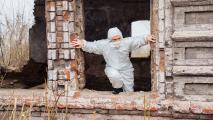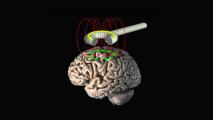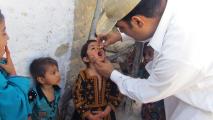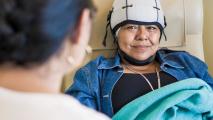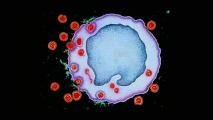
Biotech
Human history has been all but defined by death and disease, plague and pandemic. Advancements in 20th century medicine changed all of that. Now advancements in 21st century medicine promise to go even further. Could we bring about an end to disease? Reverse aging? Give hearing to the deaf and sight to the blind? The answer may be yes. And soon.
More
Deal brings COVID-19 vaccines into conflict zones
The U.S. has brokered a deal between Johnson & Johnson and the COVAX initiative to get COVID-19 vaccines to people in conflict zones.
DeepMind’s AI lights path to faster drug development
Alphabet has announced the launch of Isomorphic Labs, an AI-driven drug discovery company built on research from its DeepMind subsidiary.
Just $50 can turn your phone into a powerful chemical, pathogen detector
If this becomes a common feature of smartphones, it could someday allow anyone to identify pathogens and detect impurities in food.
Can testicular tissue restore childhood cancer survivors’ fertility?
A procedure that used frozen testicular tissue to restore fertility in animals could soon do the same for childhood cancer survivors.
Pfizer’s antiviral pill cuts COVID-19 hospitalization, death by 89%
Pfizer’s antiviral pill to treat COVID-19 cut the risk of hospitalization or death by 89%, according to early results from a phase 2/3 trial.
Scientists relieve depression with magnetic brain stimulation
Researchers at Stanford University believe they’ve developed an effective and quick-acting technique to treat challenging cases of depression — using magnetic brain stimulation.
Tissue implant extends lives of children born with athymia
A treatment that could dramatically extend the lives of children born with the rare condition athymia has been approved by the FDA.
Rhode Island will be the first state to open safe drug consumption sites
In an important test of drug harm reduction techniques, Rhode Island is set to become the first state to open safe consumption sites.
A new clue in why oral vaccines don’t work as well in developing countries
Oral vaccines are crucial to public health, but work worse where they are needed most. A new mouse study has a potential reason why.
A brain implant lets a blind person see again — without using their eyes
A former science teacher who had been blind for 16 years received a brain implant that allowed her to see shapes again.
Rwanda is blasting killer mosquitoes with drones
Rwanda is deploying drones to target mosquito larvae — spraying anti-mosquito insecticides in areas where the frequency of mosquito-borne illness remains high.
Preventative breast cancer vaccine enters human trials
A breast cancer vaccine entering human trials is designed to prevent triple-negative breast cancer — the deadliest, most aggressive form.
Merck is making its COVID-19 antiviral pill more affordable to low-income countries
Drug maker Merck has agreed to license a promising antiviral pill to treat COVID-19 to low- and middle-income countries for free.
You can now mix and match COVID-19 booster shots
Americans eligible for COVID-19 booster shots no longer need to stick to one brand. Here’s why that’s a big deal.
FDA panel recommends COVID-19 vaccine for 5 to 11 year olds (Updated)
An FDA panel voted to authorize Pfizer’s COVID-19 vaccine for kids ages 5 to 11. Here’s what you need to know about it.
Scientists got an animal to breathe without oxygen
Scientists discovered a way to keep tadpoles alive, even without environmental oxygen — by injecting photosynthetic algae into their brains.
Lizard regenerates perfect tail thanks to stem cells
A USC study that prompted lizards to regenerate tails that were “perfect” could help facilitate breakthroughs in human regeneration.
First-ever: drone delivers lungs for transplant
An uncrewed drone has carried a pair of lungs from Toronto Western Hospital to Toronto General Hospital. It was the first time lungs were transported by drone anywhere in the world.
Cooling caps can help prevent chemo hair loss
Chemo hair loss is a common side effect for cancer patients, but cooling caps can help limit the loss.
HIV treatment gets green light for human trials
Excision BioTherapeutics is cleared to begin human trials of a CRISPR-based HIV treatment that’s administered in just one IV infusion.
Get inspired with the most innovative stories shaping the world around us.













